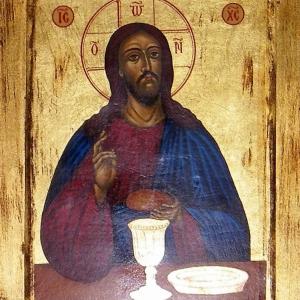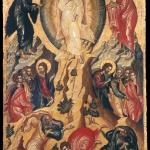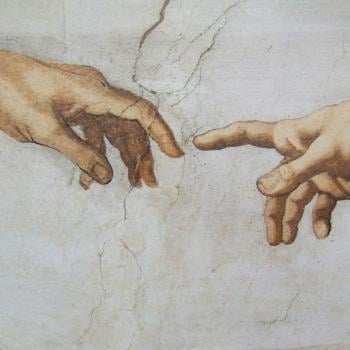
St. Albert the Great, explaining the significance and value of the eucharist, said that we must receive it as a gift of grace. The eucharist is not something we earn. We certainly cannot do anything which would make us worthy, that is, equal, to all that is contained within it. When we partake of it, we receive Christ, and in and through Christ, we receive all the grace Christ which offers us for our salvation and sanctification (and deification):
He provided himself in all his fullness in this sacrament of sanctification; indeed, no one could ever earn this by any merit, ever obtain it at any price. Therefore, it is said, “Hearken diligently to me, and eat that which is good, and your soul shall be delighted in richness.” [Is 55.2] For here the good of every good is eaten. And the wretched and destitute soul is delighted by the richness of the sweetness of God. And no one can merit this, nor buy it. And so it can be nothing but grace. For if what is held freely is called grace, this sacrament, in which God gives himself to us, can be nothing but grace. [1]
With the eucharist, we receive the gift of Christ himself. As Christ is God the Logos, all things which have been made, have been made in and through him (cf. Jn. 1:3). That means, every good is to be had from him. To receive the eucharist, we receive the source and foundation of all that is good, so that we have what is needed for our own good. Indeed, as we are not the source and foundation of the good, but only participants in it, we cannot establish the fullness of the good by ourselves. No matter what we do, all the good we do comes from and engages the good beyond ourselves, and so, to engage more of the good, we should welcome its source in us, and in doing so, find ourselves uniting with it. This is why nothing we do, even acts of piety, can be said to make us worthy of the eucharist. The eucharist is the gift we need to become better, to embrace the greater good. This is why, if we think we are worthy of it, we already have lost sight of it, and undermine the sacrament. For it is not what we do, but what it does, which is important. It is grace. Through it, not before we receive it, we become pious:
For it is called the sacrament of piety because it comes forth from the highest piety of God, and is manifested in the corporeal and sacramental eating, and causes perfect justice in our spirit. It has appeared to the angels since all the angels attend every consecration of the body of Christ. It is what is preached to the Gentiles, so that they may be made one body in Christ. It is what is offered to the whole world as good giving growth, and it is what is continuously taken up in glory for us as a sacrifice of praise. [2]
The greatest act of piety, the kind which we assume in relation to the eucharist, is not ours, but that of God. When we focus too much on our own actions, when we try to suggest piety is established by following particular aesthetic and liturgical preferences, we stray from true piety; we become too focused on ourselves, and our likes and interests, making more out of our preferences than they are worth. True piety is found in us when we are united with God through communion. It is easy to appear pious to others by focusing on human conventions of piety. Going through the motions is not what makes us pious. Pomp and circumstances, even if they are pleasing to us, or especially if they are pleasing to us, is not about piety but rather, satisfying our own particular likes and desires. We need to think beyond that. We need to understand piety, like every other good, is something which can only be fulfilled with grace. To properly receive the eucharist, we need to accept the gift which is being given to us, not with selfishness seeking after our own interests, but with love which moves us beyond ourselves. We can receive the eucharist in a variety of external forms, in various conventions established to meet people within particular contexts. Such conventions must give way to Christ. Any attempt to promote reception of the eucharist based upon false piety ultimately cut us away from the simple humility and love we should have if we want to share in with the piety of Christ. Is there any wonder why such a focus, even if we speak beautifully of the eucharist and Christ’s sacramental presence, has us lose sight of that presence, leading many to question its reality?
If we want to embrace the real presence, we must let Christ embrace us. When we take communion, we must let ourselves be taken in by Christ. We must join ourselves with Christ. We must let Christ supply what is lacking in us instead of trying to supply it ourselves. Thus, as St. Gregory of Nyssa preached:
We become what we love, either a good or foul odor of Christ. The person who loves beauty will become beautiful once he has been transformed by the good he received. The ever-existing good desires to give himself to us as food in order to transform us into what he is. “My flesh is food indeed, and my blood is drink indeed” [Jn 6.55]. Thus the person who loves this flesh is not sensual,, and he who is well disposed to this blood will be cleansed from physical blood. The Word’s flesh and blood of the person in this flesh do not constitute one grace only; rather, it is sweet for whomever tastes it, yearned for by whomever desires it and lusted after [erasmion] by whoever loves it [agaposin]. [3]
If we want beauty in the world, we must let beauty come into us and embrace us; we must let the spiritual food we take, the eucharist, transform us instead of trying to transform the world around us with artificial glory. This is not to say there is no place for such grandeur, but for us, its greatest, purest form, should come out of our experience of the beauty we received in the eucharist. It must be something shared, not forced; it is something which should organically develop instead of being artificially constructed. There can be and will be many ways this beauty can be manifest in the world. This is due to is transcendent greatness. This is why those who rely upon their own understanding and comprehension of it and try to force others to follow their own limited understanding of it will end up creating a false beauty, for they will put their limited form of beauty in the place of the transcendent beauty. This is what happens when all kinds of excessive grandeur is forced upon the world, where, despite its technical greatness, the spirit of beauty is not there. What it does, then, is impose upon others instead of lift them up, constricting them to what is established instead of letting the beauty and goodness of God reveal the transcendent beauty to us.
[1] St. Albert the Great, On the Body of the Lord. Trans. Sr. Albert Marie Surmanski, OP (Washington, DC: CUA Press, 2017), 33.
[2] St. Albert the Great, On the Body of the Lord, 40.
[3] St. Gregory of Nyssa, Homilies on Ecclesiastes. Trans. Richard McCambly. Ed. John Litteral (Ashland, KY: Litteral’s Christian Library Publications, 2014), 74 [Homily 8].
Stay in touch! Like A Little Bit of Nothing on Facebook.
If you liked what you read, please consider sharing it with your friends and family!
N.B.: While I read comments to moderate them, I rarely respond to them. If I don’t respond to your comment directly, don’t assume I am unthankful for it. I appreciate it. But I want readers to feel free to ask questions, and hopefully, dialogue with each other. I have shared what I wanted to say, though some responses will get a brief reply by me, or, if I find it interesting and something I can engage fully, as the foundation for another post. I have had many posts inspired or improved upon thanks to my readers.













